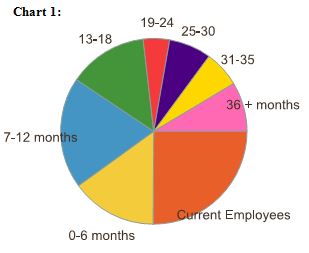Getting to the heart of why in-home services therapists leave their job is difficult. To better understand what motivates therapists to stay or leave, we conduct exit surveys for employees who quit as well as an annual survey of current employees.
While we find that staff leave for a wide variety of reasons, themes that arise in these surveys tend to suggest that therapists would like
- higher compensation,
- more training, and
- more supervision time.
We also believe that a key factor in preventing turnover is understanding the millennial workforce. The book Keeping the Millennials gave us some good ideas of how to make us an appealing place to work for this generation. It suggests that having a “cool workplace” is important.
The millennial generation likes to
- feel connected,
- have access to technology,
- have a flexible workplace and schedule, and
- feel like they are making a contribution to the agency and community.
The book also suggests that it is important to “identify the keepers.” This means that we should identify those who we want to have stay, and be sure to let them know they are important and needed. They suggest giving these individuals special projects to allow them to feel like they are contributing or perhaps “groom them” to take over when current leaders retire.
What We Have Done
We have begun taking steps to address the factors we believe are contributing to our high rates of turnover.
- The Board of Trustees has increased the therapist salary matrix two years in a row to be more competitive with similar agencies.
- As stated above, the agency administers employee surveys annually, as well as exit surveys for employees who leave the agency, in an effort to better understand what would make us a more attractive employer.
- We recently launched a social networking site responding to employees’ desire for more opportunities to get to know each other.
- We also have strict hiring procedures to try to hire therapists that best fit the organization’s value system and mission.
- We seek and use staff input in management decisions.
- We offer supervision toward licensure to encourage therapists to stay longer.
- Our agency maintains a 5 to 1 supervisor to therapist supervision ratio to support therapists.
We have tried to implement ideas from the literature on millennials.
- When we identify staff members we believe have strong leadership potential, we send them to our supervisor training and have them fill in when the actual supervisor is on vacation or otherwise unavailable.
- We are also trying to give therapists opportunities to contribute to our agency beyond their regular responsibilities.
- We also try to celebrate employment anniversaries in a way that creates a culture of wanting to stay at the agency for a long time.
It is too soon to tell if our efforts have improved therapist turnover, but we are hopeful that as we continue to strive for a fun and fulfilling work environment, our staff members will want to stay for years to come.
_______________
 Posted by Don Fryberger
Posted by Don Fryberger
Therapist/Administrative Associate
Institute for Family Development

